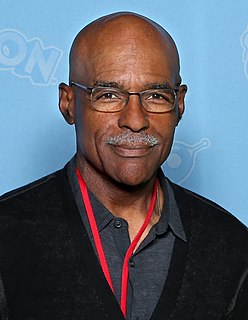A Quote by David Mamet
Don't write stage directions. If it is not apparent what the character is trying to accomplish by saying the line, tell us how the character said it or whether or not she moved to the couch isn't going to aid the case.
Related Quotes
Stage is so important because it teaches me how to convey character with words - how to convey how a character reacts by the way they appear on stage. I can usually tell a playwright from someone who has never written for the stage. Did the character work? Did the dialogue reveal who the character is?
Writers shouldn't fall in love with their characters so much that they lose sight of what they're trying to accomplish. The idea is to write a whole story, a whole book. A writer has to be able to look at that story and see whether or not a character works, whether or not a character needs further definition.
All those years on the psychiatrist's couch and suddenly the couch is moving. Good God, she is on that couch when the big one hits. Maidy didn't tell you, but you know what her doctor said? She sprang from the couch and said, "My God, was that an earthquake?" The doctor said this: "Did it feel like an earthquake to you?
A woman can be demure, lady-like and the most prim and proper character, and still have a toughness and resiliency as apparent as a superhero-type female character or a warrior or soldier type. It's all about the story, the character, and the course of events in that piece of work and how that character is presented.
It was seriously just a name. They didn’t tell you what to do. They didn’t tell you how they wanted the character to be - nothing. You went in to audition for this character name and that was it. When I started, before I came onto the set, I went to Gene Roddenberry and said: hey, what do you want from this guy? Who is he? And being as smart as he is, he said: don’t listen to what you’ve heard or read or seen in the past, nothing. Just make the character your own. And that’s what I did.
When I moved to L. A. with this little wimpy garage band, the first people we met were the Doors. Then we met Jimi Hendrix, Janis Joplin. All of the people who died of excess were our big brothers and sisters. So I said to myself: How do you become a legend and enjoy it? The answer is to create a character as legendary as those guys and leave that character on the stage.
When you are writing, you have to love all your characters. If you're writing something from a minor character's point of view, you really need to stop and say the purpose of this character isn't to be somebody's sidekick or to come in and put the horse in the stable. The purpose of this character is you're getting a little window into that character's life and that character's day. You have to write them as if they're not a minor character, because they do have their own things going on.
Once, during an interview in front of my wife, I was asked, "Are you one of those actors who brings your character home? Do you stay in character?" I said, "No, not really. I don't do that," and she started laughing. I asked her why. She said, "Well, you might think you don't bring characters home, but you do." So, while I don't feel like a character is lingering, it probably is.
The script that I fell in love with and adored was 'Jane the Virgin'... but every line in the pilot was essentially, 'Why did you keep my daughter a secret all of these years?' I didn't know any direction my character was going - was it going to be a dramatic character, a comedic character? - I didn't know.
The thing video games had to learn was to write, which is not to let people choose their own stuff, but actually prescribe it. To say, "This character is not a blank canvas that you can project onto. I'm going to tell you what this character is like. And I'm going to tell you what happens to them. You're going to feel involved in other ways." Video games made the mistake of thinking everything had to be projectable, and this doesn't do that at all.
Not every character that you play is going to be somebody that you like or love, but every character that you play has a story that is worth telling. If you're not the person to tell it, that's one thing. But if you don't want to tell it because you are afraid of the unpopularity of the character, I view that as a missed opportunity.
Character: The ability to carry out a worthy decision after the emotion of making that decision has passed. Character simply stated is doing what you said you were going to do. If you develop a reputation for that, do you have any idea the effect that has on self-perception? Its immense, just immense. The Savior was a man of character. He did everything he said he was going to do.





































